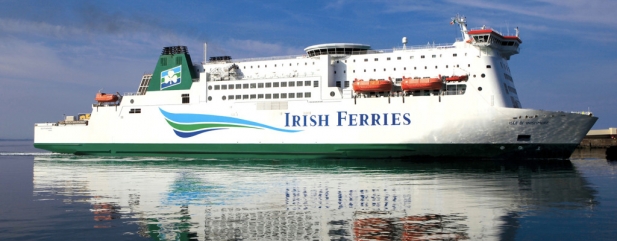Archived article
Please note that tax, investment, pension and ISA rules can change and the information and any views contained in this article may now be inaccurate.
Irish Continental looks to sail through choppy Brexit waters

Shipping and transport group Irish Continental (ICGC) has taken steps to accelerate future earnings growth after investing more than €300m in two new ships.
This investment is a display of confidence in the future despite the potential for disruption from Brexit.
Irish Continental owns Irish Ferries, comprising five modern ferries on routes between Ireland and the UK, as well as between Ireland and France. Under this division, Irish Continental provides ship chartering activities both within the group and to third parties.
The Ferries division is a key driver of profitability, generating 61% of overall sales and 81% of operating profit in 2017.
The remainder of its revenue and profit was generated by its Container and Terminal division. Operating as Eucon, it is a leading container shipping operator between Ireland and Europe.
It operates five chartered vessels between the ports of Dublin, Cork and Belfast to Rotterdam and Antwerp.
Over the last five years, shares in Irish Continental have nearly tripled in value to €5.70 (20 April). Despite this impressive share price rally, the company trades on an undemanding 16.7 times forecast earnings per share for the year to 31 December 2019.
INVESTING TO MEET DEMAND
The funds required to buy the two new ships come from a combination of internal cash flow, lending from Allied Irish Banks and the European Investment Bank and loan notes issued by Metropolitan Life Insurance and Pricoa Capital.
The first of new vessels, christened W.B Yeats, is expected to start sailing passengers directly from Dublin to Cherbourg, France in July.
With room for 1,885 passengers and crew, W.B Yeats boasts luxury suites with private balconies, as well as a cinema, shopping mall and several restaurants.
The second vessel is expected to be delivered in April 2020 to commence operations on the Dublin-Holyhead route, according to the company.
Investment has also being poured into marketing and promotional activity in Britain, Ireland and France. In 2017, Irish Continental invested significantly in its brand by offering personalised offers, helping to generate over 6m visits to the Irish Ferries website.
Pre-tax profit jumped from €60.4m to €87.7m in the year to 31 December 2017, helped by the sale of vessel MV Kaitaki to KiwiRail, producing a €28.7m gain.
Solid sales growth is forecast, rising from €348.8m in 2018, to €365.4m in 2019 and €378.2m the year after.
Pre-tax profit is expected to decline to €58.8m in 2018 according to Investec, before rising to €63.4m in 2019 and €65.7m in 2020.
VOLUME GROWTH BOOST
Irish Continental enjoyed a resilient performance last year thanks to volume growth in passengers and cars for roll-on/roll-off (RoRo) ships.
The Ferries division revealed volume growth of 1.7% for passengers, 2.4% for cars and 0.5% for RoRo freight. A 5.9% increase in shipped container volumes and 3% uplift in port lifts underpinned a decent performance in the Container and Terminal business.
Prolonged bad weather was a headwind for Irish Continental in the first two months of 2018, hitting conventional sailings by 9% year-on-year, but this is not expected to impact trading in the longer term.
Davy Research’s Stephen Furlong says accelerating car and RoRo volumes will offset the impact of higher oil prices, currency movements and the loss of chartering income from the Kaitaki sale.
‘With the arrival of the new ship in the summer, we would expect ICG to outperform the market growth rates of 2% in cars and 5% in RoRo – probably in both cases above mid-single digit,’ comments Furlong.
IRISH ECONOMIC RECOVERY SUPPORTS TRADING
An ongoing economic recovery in Ireland is important for Irish Continental as it should stimulate demand from passengers and for container transportation services.
Following the 2008 crash, banks in Ireland required an expensive bailout to avoid a collapse, while the country suffered from slower economic growth and higher unemployment.
Over the last couple of years, Ireland’s economic picture has improved. In 2017, the country’s economy grew 7.3%, which is expected to moderate to 4.4% in 2018 and 3.1% in 2019, albeit still good levels of growth.
WHY BREXIT COULD BE BAD NEWS
Brexit negotiations are a risk for Ireland as current economic forecasts are based on trading relations between the EU and the UK remaining the same, which is not guaranteed.
An impact study commissioned by the Irish government suggests Ireland could be impacted more by Brexit than any other country in Europe.
The data estimates a hard Brexit and dependence on World Trade Organisation rules could cost Ireland’s economy €18bn.
Airlines could also threaten Irish Continental with faster flights and low prices as the heavy competition in the sector is prompting heavy discounting. (LMJ)
Important information:
These articles are provided by Shares magazine which is published by AJ Bell Media, a part of AJ Bell. Shares is not written by AJ Bell.
Shares is provided for your general information and use and is not a personal recommendation to invest. It is not intended to be relied upon by you in making or not making any investment decisions. The investments referred to in these articles will not be suitable for all investors. If in doubt please seek appropriate independent financial advice.
Investors acting on the information in these articles do so at their own risk and AJ Bell Media and its staff do not accept liability for losses suffered by investors as a result of their investment decisions.
Issue contents
Big News
- Eurozone relief... but for how long?
- Good week for the markets but setbacks for Reckitt and Clarkson
- Stadium purchase to accelerate TT Electronic’s profits scale
- Online isn’t necessarily the ticket to retail success
- Should shareholders get involved with Capita’s £701m rights issue?
- Fast growth vaping firm Supreme to float on the stock market

 magazine
magazine











